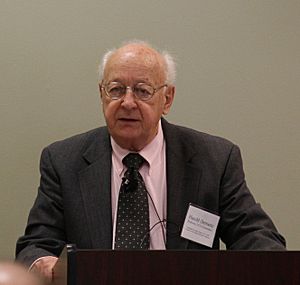Harold Demsetz facts for kids
Quick facts for kids
Harold Demsetz
|
|
|---|---|
 |
|
| Born | May 31, 1930 |
| Died | January 4, 2019 (aged 88) |
| Nationality | American |
| Institution | UCLA University of Chicago |
| Field | Managerial economics |
| School or tradition |
New institutional economics |
| Alma mater | Northwestern University University of Illinois |
| Contributions | Nirvana fallacy |
| Information at IDEAS / RePEc | |
Harold Demsetz (born May 31, 1930 – died January 4, 2019) was an American professor. He taught economics at the University of California at Los Angeles (UCLA). He was known for his important ideas in how economies work.
Contents
A Look at His Life
Harold Demsetz grew up in Chicago, Illinois. His grandparents came to America from Europe. He studied many different subjects in college. These included engineering, forestry, and philosophy.
He earned his first degree in economics in 1953. He then got his master's degree in 1954. Finally, he earned his Ph.D. in 1959. All his economics degrees were from the University of Illinois and Northwestern University.
Teaching and Research
Demsetz taught at several universities. He worked at the University of Michigan from 1958 to 1960. Then he taught at UCLA from 1960 to 1963. He also taught at the University of Chicago from 1963 to 1971.
In 1971, he went back to UCLA. He stayed there for the rest of his career. He even led the Economics Department from 1978 to 1980. He was also part of important groups. These included the American Academy of Arts and Sciences.
His Economic Ideas
Harold Demsetz was a key thinker in economics. He was part of the "Chicago school" of economic ideas. He also helped start a new way of thinking called "New Institutional Economics."
New Ways of Thinking
New Institutional Economics looks at how rules and organizations affect the economy. It studies things like property rights. These are the rules about who owns what. Demsetz helped explain how these rules shape economic decisions.
He also helped create "managerial economics." This field studies how businesses are run. It looks at how companies make choices and organize themselves.
Demsetz wrote a lot about how companies compete. He studied rules about business and how they work. He often explained his ideas using clear words, not complex math. This was unusual for economists at his time.
The Nirvana Fallacy
Harold Demsetz came up with the term "nirvana fallacy" in 1969. This idea is about how we solve problems. The nirvana fallacy happens when people compare a real-world problem to a perfect, imaginary solution.
Demsetz argued that this is not helpful. He said we should compare real-world options to each other. We should look at what's possible, not just what's ideal.
One of his most famous articles was with Armen Alchian. It was called Production, Information Costs and Economic Organization. This article was chosen as one of the most important in a major economics journal.
 | Janet Taylor Pickett |
 | Synthia Saint James |
 | Howardena Pindell |
 | Faith Ringgold |

